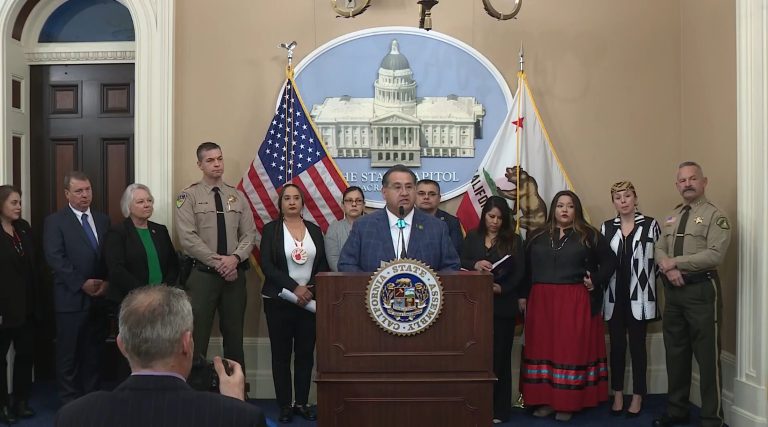Podcast: Play in new window | Download | Embed
This week, U.S. Reps. Sharice Davids (Ho-Chunk/D-KS) and Tom Cole (Chickasaw/R-OK) reintroduced legislation to investigate, document, and report on the histories of Indian boarding schools and their long-term impacts on tribal communities.
The bill has been endorsed by the National Native American Boarding School Healing Coalition (NABS).
NABS CEO Deborah Parker talked about the legislation at the 2023 White House Tribal Nations Summit.
“It’s much needed to help us tell the story, help us understand what happened to our Native American children in U.S. boarding schools. And we deserve, America deserves, not only Native Americans, but students, but people, any human being who is living today deserves to understand the truth about what happened in the United States.”
Parker says they’re seeking records and information from both the federal government and churches that ran the schools.
“We know parents are still looking for children to this day, their relatives who never came home. Most of the parents are no longer with us, but there are elders who have brothers and sisters, siblings, cousins who never made it home from the boarding school. So, they are missing. We’re trying to help families locate their loved ones…we still know our communities have, we have broken systems within our communities because we don’t know where our loved ones are.”
The legislation would establish a formal commission to investigate federal Indian boarding school policies, develop recommendations for federal entities to help with healing efforts, and provide a forum for victims to speak.
Reps. Davids and Cole, co-chairs of the Congressional Native American Caucus, say they’re committed to investigating the abuses at the institutions, which are connected to an estimated 500 student deaths.
The Truth and Healing Commission on Indian Boarding School Policies Act of 2024 has also been endorsed by the National Congress of American Indians.
 An Indigenous author recently released a children’s book on the jingle dress dance and its healing power.
An Indigenous author recently released a children’s book on the jingle dress dance and its healing power.
As the Mountain West News Bureau’s Kaleb Roedel reports, the idea for the book came about during the COVID-19 pandemic.
During the pandemic, Deidre Havrelock saw countless videos online of Indigenous women and girls jingle dress dancing – a century-old tradition that started during the global flu pandemic.
Havrelock is a member of the Saddle Lake Cree Nation in Alberta, Canada.
“I was like, no wonder it’s just so beautiful, right? It’s 100 years later, and they’re still doing this – even more so, like, it’s just exploded. And, I thought, I wanted to capture this historic moment through a picture book.”
Why We Dance: A Story of Hope and Healing follows a young girl’s relationships with her mother, aunt, and cousin as she gets ready for the Jingle Dress Dance.
The lyrical story ends with colorful illustrations of the joyful dance.
Illustrator Aly McKnight is a member of the Shoshone-Bannock Tribes in Idaho.
“Celebrating healing is such a needed thing in this world, just considering what we deal with on a daily basis. And kids need that – like, adults need that.”
The book is available in libraries, bookstores, and online.

Courtesy Grand Canyon University Athletics
The Native American Basketball Invitational (NABI) announced Wednesday a partnership with Grand Canyon University (GCU) in Phoenix, Ariz.
NABI serves Native youth and hosts an all-Native basketball tournament.
In 2023, Native youth from across the U.S., Canada, and as far away as New Zealand took part in week-long events using courts across the Phoenix area.
The partnership at GCU is expected to host more than 160 teams this summer with more than 1,600 athletes and 400 games on the college campus – utilizing 13 courts.
The championship games will continue to be held in downtown Phoenix at the arena where the Phoenix Suns play.
New Year. New Newsletter. Get National Native News delivered to your inbox daily and stay up-to-date on the 2024 Native Vote. Sign up for our daily newsletter today.



